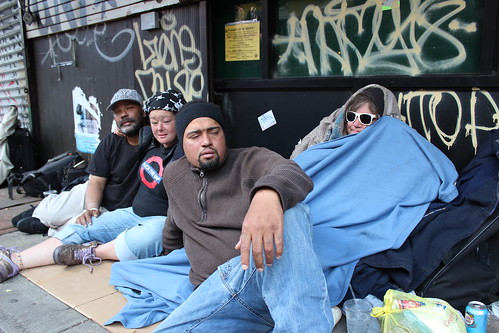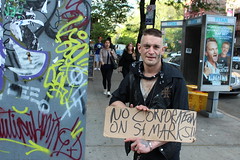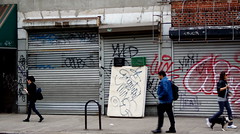Half a dozen homeless people have taken shelter under the awning of the shuttered East Village Farm, and police are allowing them to stay even as neighbors complain of unsanitary and potentially dangerous conditions on Avenue A.
Outside of the former grocery store, which closed in February, the group of black, white, and Latino men and women in their 30s to 50s makes do with a handful of blankets and a couple of sheets of cardboard laid on the sidewalk. They pass cigarettes to each other and sometimes pool small amounts of money, most of it acquired through panhandling. “We’re a family,” said one man.
“D,” a 49-year-old former clerical worker from Brooklyn, who like other members of the group wished to remain anonymous, said the police had tentatively allowed them to remain on the stretch of sidewalk between Sixth and Seventh Streets, provided they keep the area in order.
“They try to make sure we keep it clean and they try to keep the number of people down,” she said. “A couple of times when a couple people were acting out of turn, they had us leave and they let us come back because unfortunately occasionally you get someone who’s a drunk or something, passing by and starting a fight.”
Capt. John Cappelmann told The Local that neighbors had complained of squatters camping inside of the grocery store, but none were spotted during sweeps. He said his officers had coordinated with the police department’s Homeless Outreach Unit and other agencies to try to assist members of the group, but such efforts could only go so far. “If someone’s homeless and they don’t want contact with police — it’s not illegal to be homeless,” he said, adding, “If they don’t want placement, if they don’t want help, that’s their decision.”
Joel “L.E.S. Jewels” Pakela, a self-declared “gutter pirate,” quipped that certain members of the group were “some of the last dinosaurs from Tent City,” the homeless encampment in the park that was torn down by police in 1989, although no one from the camp said they had lived in Tent City. Mr. Pakela often solicits change a block up from East Village Farm, on a stretch that has long drawn loiterers and panhandlers, to the increasing chagrin of residents and business owners.
At last night’s Community Council meeting, Tom Birchard, the owner of Veselka who also owns a building on the block between Seventh and Eighth Streets, joined tenants in complaining about the sidewalk dwellers. “They use the front of the building as a toilet. They spread food everywhere. Tenants have trouble getting in and out of the building,” he said.
Detective Jaime Hernandez with Community Affairs pointed to cheap-eats joints Ray’s Candy Store and Odessa as reasons why the homeless people were drawn to the location, as well as the free food given away on a daily basis across the street in Tompkins Square Park. “It has become a central location for people to get their food seven days a week,” he said.
Det. Hernandez suggested that neighbors explain their concerns about the homeless people to employees at Ray’s and Odessa. But today, Mike Skulikidis, one of the owners of Odessa, said he was already aware of the problem – in fact, he calls the police a couple of times a week. “They leave garbage all over, cans, all kinds of things. A lot of fights among them,” he said.
In the past, he said, he has helped certain homeless people, but not the current group. “A lot of them, they are on drugs,” he said. “A lot of them, they are drunks. They’re laying on the sidewalk.”
But D, a full-faced woman with messy brown hair who wouldn’t necessarily appear homeless if you passed her in the street, said she did not abuse drugs or alcohol. She said she had been unable to work since 1994 due to disabilities and a slew of health problems. She has trouble walking due to what she said was a combination of herniated discs, myalgia, sciatica, and arthritis that she developed after she fell down a flight of stairs.
D said she became homeless after her Section 8 housing benefits were cancelled last year, leaving her to survive on her meager SSI disability benefits. She has a 24 year-old daughter who lives on her own and two twins who live in foster care, she said.
“I was a stable person before all of this stuff happened. For 20 years I lived on the same block,” she insisted, adding that she was a born-again Christian who had participated in a homeless ministry for five years before she became homeless herself. She said she and others preferred to sleep in the street because of poor conditions in shelters. “They’re unclean. They’re unsafe. They’re dangerous.”
Most of her cohorts, she said, had gravitated toward East Village Farm after being routinely shooed away from restaurants and apartment buildings.
Maya Noah, 37, a bartender at Sidewalk Cafe, adjacent the former grocery store, said that members of the group were sometimes intrusive. “They kind of try to engage the customers at the table and on the sidewalk, and it can be problematic and disruptive, especially during a brunch shift when it’s really busy.”
But she was forgiving of the disruptions. “My feeling is that, I mean, they’re homeless,” she said. “What are you going to do. They have nowhere to go. They have a right to survive just as anyone else does.”
This post has been revised to reflect the following correction:
Correction: May 16, 2012
Due to an editing error, an earlier version of this post misidentified the time and place when Capt. John Cappelmann spoke about sweeping the East Village Farm building for squatters. He spoke to The Local about it on Wednesday and did not address the Community Council about it on Tuesday.






